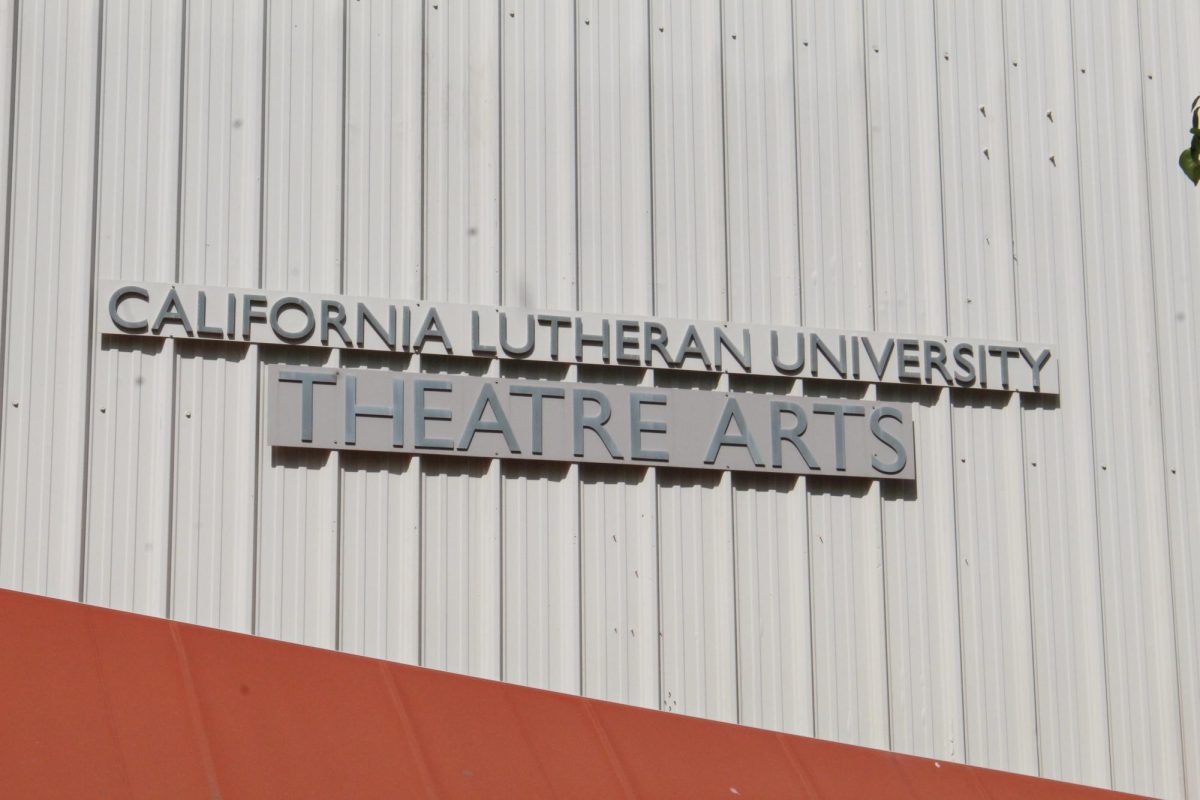Editor’s Note: The Echo decided to grant anonymity to two sources in this article, following their requests out of fear of retribution from individuals within the Theatre & Dance Department. These sources will be referred to under the pseudonyms ‘Jennifer’ and ‘Mary’.
California Lutheran University Theatre Arts & Dance students voiced concerns to The Echo after facing restrictions and miscommunication from multiple departmental faculty members while preparing for their culminating production, the “Senior Capstone Showcase,” held March 20 to 22 in the Black Box Studio Theatre.
“They sometimes would treat us like an outside company, and sometimes they wouldn’t, and sometimes they would treat us even worse than they would treat an outside company,” said junior Logan Smoot, the lighting and sound designer for the showcase.
Participation in the capstone class is a graduation requirement for Theatre Arts majors, according to Cal Lutheran’s program catalog. Designed by former professor Michael Arndt, the class simulates a real-world production, with students operating as an independent theatre company using the Black Box space to write, direct and produce 10-minute performances, said Kenneth Gardner, professor of drama.
“He [Arndt] wanted the capstone class to form their own company to give them the experience of what it’s like to put together a company to rent a space,” Gardner said.
Gardner, who began teaching the class in the spring of 2024, said new restrictions from technical theater faculty involving which equipment and facilities the company could use became prominent this semester after “misunderstandings” about the structure of the capstone class arose from other Theatre & Dance Department representatives.
“Last year, we didn’t have all these restrictions. I mean we had a budget, we had a deadline, we had certain restrictions on what we could use in terms of sets, but this year it sort of came back to really haunt us,” Gardner said.
As a result, students said technical and company rules, including class deadlines and rental policies for their organization, The Yellow Umbrella Company, were miscommunicated.
“There are some, like, tensions between the faculty in the department. It starts at the top and it trickles down,” said senior Alexandria Reynoso, a student-director in the showcase.
A capstone student, who will be referred to by the pseudonym Jennifer, said they first felt restrictions in place the day after capstone auditions were held on Feb. 8, when “probations” were emailed out to select Theatre & Dance students who auditioned.
Jennifer said probations are short-term suspensions that prevent students from acting in any departmental productions for the semester. Gardner said this was the first time probations had been “seriously implemented” within the department.
“Emails went out to many of the students that we were most likely going to be casting, saying that they were put on probation, which essentially meant that because they hadn’t fulfilled a crew assignment as a part of their VAPA,” Jennifer said.
Visual and Performing Arts (VAPA) scholarships are granted to students with “superior talent in the areas of Music, Music Production, Theatre Arts, or Visual Art,” according to the Cal Lutheran Financial Aid page. Students can renew these scholarships for up to full tuition annually by maintaining their contract requirements.
Head of Design Andrea Heilman said Theatre Arts & Dance students must request a run crew assignment at the beginning of the semester or work 40 hours in the scene shop to fulfill their VAPA contract. She said she tracked all students’ requests that were submitted to her and made multiple attempts to accommodate crew requests around students’ availability, but students still missed this requirement.
“I then share that information with the department chair who sends out those emails. I do not know exactly when she sends out those emails, so I was not aware that that happened the day after capstone auditions. So but that had nothing to do directly with capstone auditions, I’d like to clarify that point, those are two very separate things,” Heilman said.
However, students have raised concerns over the strict enforcement of the 40-hour requirement, calling it “inconsistent.” They argue that the 2024/20245 VAPA contract they signed failed to clarify how many hours students should work when there are no run crew spots. The contract also fails to name consequences for students unable to meet the full 40 hours due to outside responsibilities or emergencies.
“One had a death in the family. There, there was another one who tried to fulfill them, had some conflicts with academics and felt they tried to fulfill it, and were still put on probation,” Gardner said.
Gardner says the department needs to establish “a fair and just” method for students to appeal probation placements. Heilman said that this policy was approved by the entire department before it was put in place.
“The department collectively determined that crew is something that right now is a requirement, and that is not my personal job to defend that. There used to be other options, but those options were removed by other faculty,” Heilman said.
Aside from probation, Jennifer said the company’s fictitious $500 budget to rent Cal Lutheran-owned rehearsal spaces, props and production materials as “unnecessary” compared to past class budgets of up to $2000.
“The budget was fake in the sense that no money was really spent, unless it was for costumes and posters and such, but we had to rent out pretty much every prop that you see on the stage during capstone,” Jennifer said.
Jennifer said renting each prop, including plastic chairs and wooden boxes from their classroom, would cost the company around $20 of their budget.
“The problems came into play when the cost of those props that we were using was insane,” Jennifer said.
Reynoso said faculty limited student access to the common areas, including the Acting Space and Forum, unless they paid for rehearsal time out of their budget.
“There is one instance where we went into class after kind of clashing with one of the professors and the Acting Space was locked. In a sense, we couldn’t even get into our own classroom, and it was like, ‘We’re also like paying to be here, this is also our department,’” Reynoso said.
N’dia Battle, a student-director of two 10-minute plays, said she was kicked out of her own rehearsal space she had rented from the department after the faculty demanded she return a prop she had been using for weeks prior.
“I reiterated that we had been using this plenty of times before, and this was our last rehearsal before tech, and then she just picked up the bench and took it,” Battle said.
Battle said that her anxiety following the situation prompted her to call a five-minute break for the group, where she went to calm herself down in the bathroom.
“While I’m in the bathroom we hear things shifting around, I’m like catching my breath, trying to calm down, ‘cause that experience was awful. And then, I come back and all of my set pieces are gone,” Battle said.
Two hours later, Battle said this faculty member sent out an email to the company, stating that groups were now barred from rehearsing in rented spaces without supervision, causing her to feel “singled out.”
“Being someone that is already not involved in the department, it kind of just further made me detach from the department a bit more, and then it kind of made, me, other students open up to telling me about their experiences, because I had heard that she has yelled at others before,” Battle said.
A capstone student, who will be referred to by the pseudonym Mary, said rules like these that were placed “out of nowhere” by technical theater faculty prompted an emotional discussion within the class and the development of a new contract by students.
“The students actually created a petition to cancel the festival in early March, so upset with the restrictions and other things,” Gardner said.
One of the students behind the petition, Jennifer, said the plea came from a place of caring for the underclassmen who could have been impacted by repercussions if the company chose not to perform.
‘In the past, students that have spoken out about issues in the department don’t tend to get cast in shows anymore, which we’ve kind of seen as well, or they’ll get smaller roles. Now, we have the whole probation issue, that’s another thing that students are thinking about,” Jennifer said.
Following this, Smoot said Gardner brought in Dean of the College of Arts and Sciences Tim Hengst for a faculty meeting with Heilman and Technical Director Naomi Miyahara, to address student concerns.
“He [Gardner] brought all of our opinions, he asked us and wrote it down for us so that he could present the class’s opinions to them, which I thought was really cool,” Smoot said.
After a visit from the Hengst for a tech rehearsal, Battle said the pushbacks and restrictions placed by faculty slowed. Gardner says that by the time the shows started, his students “had a really positive attitude.”
“I think he [Dean Hengst] definitely impacted the overall vibe and feeling of this space. When he arrived, it felt a lot more free and enjoyable,” Battle said.
Following recent news that the dean position for the College of Arts and Sciences position will not be filled following a months-long search, Gardner said it’s concerning that no one will be in his direct oversight next year.
“There are other places we can go, but the dean is directly over you and it’s the best source to go to. There’s an associate dean for creative arts we can go to, there’s the provost, but the dean is sort of directly involved in everyday activities, and that’s a little concerning,” Gardner said.
Student directors preparing to graduate from Cal Lutheran said they are uncertain if their experiences will break the pattern of disappointment and miscommunication within the department, but say their fight for advocacy will stick with them in the real world.
“A capstone is meant to be the culmination of your time in a department and what you’ve learned, and we’ve spent the majority of our time in the department learning how to advocate for people to be support systems and to be strong leaders. I cannot think of anything more fitting and more reflective of each and every student’s time in the department than for capstone to have become as negative of an experience as it was,” Jennifer said.












